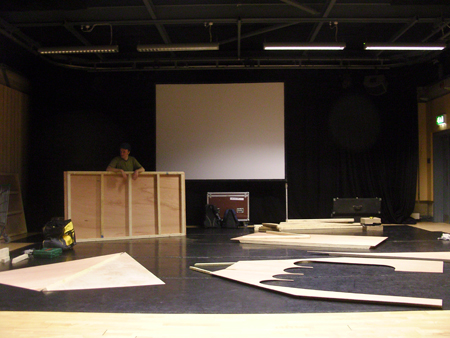For anyone that experienced the true majesty of the Enter_ opening night rave hut extravaganza and doubted its flatpack credentials...

For more photos, head over to opensourcesound.org.
For anyone that experienced the true majesty of the Enter_ opening night rave hut extravaganza and doubted its flatpack credentials...

For more photos, head over to opensourcesound.org.

 Proboscis are now setting up the Public Authoring Zone in the Maitland Room just across the lawn from the the lecture theatre. Over the next two days we will be inviting everyone at the conference to come and create a StoryCube to build up an evolving landscape of the issues, themes, ideas, people and concepts flowing through and around the conference. We hope to use the landscape of StoryCubes to create a meta-narrative of conversations and narratives in parallel to the main sessions of the conference.
Proboscis are now setting up the Public Authoring Zone in the Maitland Room just across the lawn from the the lecture theatre. Over the next two days we will be inviting everyone at the conference to come and create a StoryCube to build up an evolving landscape of the issues, themes, ideas, people and concepts flowing through and around the conference. We hope to use the landscape of StoryCubes to create a meta-narrative of conversations and narratives in parallel to the main sessions of the conference.


Just in the nick of time, the weather prevailed and Simon Keep has managed to take his balloon ride across the city in preparation for Aerial Phonography.
Check out his blog for some great test footage, and of course come along to the domes on Parker's Piece to pick up a handset and experience the final work.
Welcome to the inaugural Enter_Unknown Territories Conference and Festival!Download the programme from the main website - it's 5Megabytes but worth the electrons!
The Enter_ journey started two years ago. The re-branding of the Digital Arts Network and the start of Enter_Net’s regional activities signalled the culmination of a long-standing Arts Council England commitment towards new technology art in the Eastern region. Enter_ responded to an urge to produce and present innovative art in a prime technology environment, and to celebrate opportunities for collaboration.
Enter_ and explore with us! Beyond the environment of established arts and academic venues, festival activities take place across Cambridge: public art events, workshops and presentations in tents on Parker’s Piece (fly a spy-kite or take part in a giant potluck); get lost in an interactive maze at the Leper Chapel; experience live dance and sonic performances at the Junction, participate in debates and dialogue during the conference at Downing College – whether you are an expert or a newcomer, our activities invite you to explore, learn and share.
You won’t have to read a giant manual to enjoy the activities. Come and explore – the journey has just begun.
ENTER_UNKNOWN TERRITORIES will take place in Cambridge, England from 25-29 April 2007.